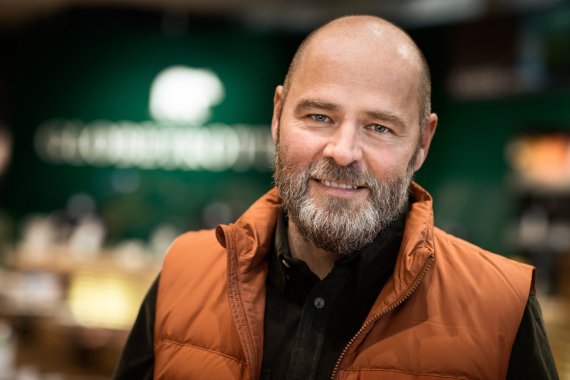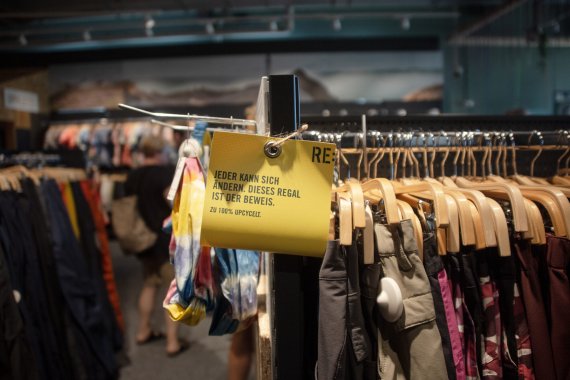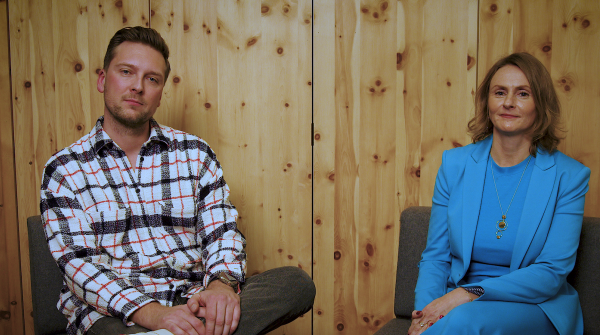When you enter the Globetrotter Re:Think store on the second floor of a small mall in Bonn, a life-size green bear made of metal immediately catches your eye. The imposing animal from the brand logo symbolizes what the store is all about: circularity. It is made from materials that were left over from the renovation of the store - plates, grids, rolls ... recycling at its best. "A lot of heart and soul went into this project, and it was no easy task to turn a former electronics store into a genuine Globetrotter store," says CEO Andreas Vogler.
Turning old into new - this is the concept behind everything in the Re:Think store. Customers learn about it on graphic walls and information boards. That's a good thing! Otherwise, they would probably not even notice that they are in a store that has also committed itself to the cradle-to-cradle principle in its store design.

Cradle-to-Cradle
The design principle was developed in the 1990s by Prof. Dr. Michael Braungart, William McDonough and EPEA Hamburg. It describes the safe and potentially infinite circulation of materials and nutrients in cycles. The aim is for all ingredients to be chemically harmless and recyclable, so that no more waste is produced in the current sense, but only usable nutrients - just like in nature. The concept of the circular economy is also based on the cradle-to-cradle principle, which aims to design economic systems in a way that is compatible with nature.
All the furniture in the 2,150 square meter Re:Think store comes either from the stock of other Globetrotter locations or from the warehouses of the brands represented. Even the changing rooms are made from old advertising banners and curtains. In total, around 94% of the materials used in the store are re-used. Backpacks now hang from the perforated walls where vacuum cleaners used to hang. The concept also focuses on sustainability when it comes to services: Customers can purchase new and used items, and a rental service is being planned. There is a buying station for second-hand goods and items can be repaired or customized in the workshop.
Globetrotter's showcase project in terms of the circular economy is impressive - and is currently winning one award after another: Red Dot Design Award in the "Brands & Communication Design" category, 1st place in the Best Retail Cases Award and now the German Sustainability Award 2023 in the sports retail category. The success is also due to the fact that the German branch of the Fenix Outdoor retail group thought through the concept down to the last detail and provided scientific support.
"One of the most sustainable approaches is to use things that are already there. It takes courage and a pioneering spirit to go down this path. But the results of the scientific study by our partner EPEA show that it's worth it." - Andreas Vogler, CEO Globetrotter

"It's not enough if we destroy the environment a little less. We have to learn to be useful for this planet," Professor Michael Braungart tells the audience at a lecture in the "Clubhütte" of the Bonn Re:Think Store. "We are the only living being that makes waste. Why are we dumber than everyone else?" The chemist and process engineer is co-inventor of the cradle-to-cradle principle. His Environmental Protection Encouragement Agency (EPEA) has evaluated the conversion and developed a "Circularity Passport Interiors" (CPI) from the results. This describes exactly which products and materials are used and how big their CO₂ impact is. "This will make it possible to compare and optimize different interior design approaches in terms of their ecological footprint in the future," says Markus Diem, Managing Director of EPEA. "This helps to save resources and avoid waste."
According to EPEA's calculations, a conventional shopfitting project of a comparable size would have generated around 105 tons of CO₂ equivalents (CO2e). The re-use concept, on the other hand, only emitted 3.12 tons of CO₂e. This corresponds to a saving of around 97%, which is roughly the amount of CO₂ that would be produced if the earth were to be circumnavigated by car around a dozen times.

As a retailer, it's not very often that you move a store into a former electronics store. And in the production and delivery process of a product, only three percent of CO₂ emissions are caused by the retailer itself. Nevertheless, it is important for the industry to reduce CO₂ emissions wherever possible. The good news first: awareness of the problem is there, and the major players in the sports and outdoor industry are now taking a consistent and structured approach to sustainability. Most retailers are focusing on the three "r's": re-use, repair, recycle.
Sport Conrad, a finalist in the German Sustainability Award 2023 together with Globetrotter and Bergzeit, has embarked on the "Sport Conrad Mountain Path". This sustainability roadmap aims to reduce the carbon footprint by 70% (Scope 1 and 2) and 50% (Scope 3) by the end of 2030 compared to the base year 2019. The measures: Reduce green electricity consumption, packaging materials and print jobs, avoid waste, return resources to the cycle, modernize locations according to environmental protection criteria and generate our own electricity via PV systems. At the same time, Sport Conrad is putting pressure on manufacturers to increase the recyclability of their products. There have already been a few pilot projects, such as "Recycle Your Boots" by Tecnica, "Goggle Recycling" by Scott and "Ski Skin Upcycling" by Doghammer. Recycling projects are also underway with Scarpa shoes and Schwalbe inner tubes.
Bergzeit has developed a sustainability strategy based on three areas of action (Save, Turn, Spread) and pursues as holistic an approach as possible: The first pillar focuses on resource consumption, the second on the circular economy and the third on customer consumption behaviour. Save: Since 2019, the Bergzeit locations have been using 100% green electricity, and since 2021 the retailer has also been producing it itself using its own photovoltaic system. This saves the company around 220 tons of CO₂ per year, taking into account the German electricity mix. Since 2023, Bergzeit has even been offering its own green electricity tariff together with the electricity supplier Energiewerke Schönau (EWS). Turn: The online second-hand store for outdoor clothing, shoes and hardware is being further expanded. Spread: The MUT (People/Environment/Animal) strategy provides customers with seals that they can use to filter products in terms of social, environmental and animal welfare characteristics.
At Intersport, the eco-strategy is called "Best in Sports: Up for Future". It covers the five fields of action of people, product range, environment, retailer and customer. Product design, quality and durability of products paired with more and more repair options are possible levers for increasingly closing cycles. By 2030, all Intersport retailers should also have implemented the minimum standard of a sustainability POS concept. The focus here is on CO₂ savings and the expansion of renewable energies, for example through PV systems, as well as the promotion of the circular economy in the product range. "The ecological footprint of a company is increasingly influencing the purchasing behaviour of consumers. But it is also about showing our members and employees how to act sustainably. After all, sustainability means future viability," says Thomas Storck, CFO and Deputy Chairman of Intersport Deutschland eG.

Sport 2000's roadmap covers the topics of "product and supply chain", "culture and mindset", "location" and "reporting". Sport 2000 International is working closely with Sport 2000 GmbH, the 5-country organization from Germany, Switzerland and Benelux, to implement the roadmap. "With employees from Sport 2000 GmbH and Sport 2000 International, a team - the Green Vision Team - has been formed that works hand in hand to achieve the defined goals," says Véronique Dell. In Germany, Sport 2000 stores receive professional climate advice. The analysis is used to check energy consumption and develop measures to use energy more efficiently. "This allows us to save resources and reduce costs at the same time," explains the Project Manager. The environmental team at Sport 2000 Austria regularly works on optimizing energy consumption, separating waste and raising awareness among employees at headquarters. Sport 2000 France uses the "Objectif Tribu" project to inform customers about the circular economy in the textile sector. Customers can hand in old shoes and textiles and receive a discount on their next purchase.
Vaude Academy
Many of the sustainability strategies mentioned here were developed in cooperation with the Vaude Academy for Sustainable Business. The offer includes lectures, workshops and individual consultations and is aimed at companies, professional networks and organizations. It ranges from concrete, individual measures to the design of a sustainable corporate strategy and the introduction of sustainability management systems.
Sustainability has also long been part of Sportscheck's corporate strategy. The focus of the circular economy is currently on reuse and second-hand. In cooperation with reverse.supply, Sportscheck is using a new circular store to test how reuse is received by customers. And a recycling system is being set up with partner I:CO, one of Europe's largest recyclers.
Yonderland 's five-year plan focuses on the promotion of sustainable, recyclable outdoor products, CO2 neutrality, waste avoidance and the protection of regional open spaces through project work and donations. The retail group's sustainability activities have already received several awards. Among others, the Dutch chain Bever received the "Sustainable Retailer of the Year 2022-2023" award. Bever was praised for its commitment to promoting the circular economy along the entire value chain. The jury also examined the sustainability strategy and was impressed by the care and repair services.
Decathlon is focusing on renewable energies, particularly in its home market of France, and is gradually installing PV systems on its stores. By 2026, the company aims to reduce its direct and indirect greenhouse gas emissions by 40% compared to 2016. By participating in the EU Green Consumption Pledge initiative, Decathlon is also committed to helping customers make more sustainable purchases. In order to make the targets and performance indicators for sustainable development in the three areas of people, planet and profit measurable and achievable by 2026, these are set out in a globally applicable transition plan that applies worldwide.
The Outdoor Retailer Climate Commitment (ORCC), a climate network of currently eleven European outdoor retailers, regularly publishes an annual report. This documents how far the companies have progressed in their efforts to reduce their CO2 emissions: All have now drawn up concrete action plans to reduce their Scope 1&2 emissions, and a total of 12,843 tons of CO2 were saved in 2023. The retailers are working together to reduce the carbon footprint throughout the supply chain. The complete report, which will be presented at ISPO Munich 2023, is already available for download.
Ultimately, it is now up to the retailers to ensure that their plans do not degenerate into lip service. And, of course, on the customers, who have to accept the sensible offers. Globetrotter CEO Andreas Vogler is also convinced of this: "Sustainability requires transparency and participation. We have a valuable resource at our disposal: direct access to millions of customers, with whom we also communicate on the topic of sustainability. With the right offers, we can make it easier for our customers to act sustainably."
- Awards
- Mountain sports
- Bike
- Fitness
- Health
- ISPO Munich
- Running
- Brands
- Sustainability
- Olympia
- OutDoor
- Promotion
- Sports Business
- Textrends
- Triathlon
- Water sports
- Winter sports
- eSports
- SportsTech
- OutDoor by ISPO
- Heroes
- Transformation
- Sport Fashion
- Urban Culture
- Challenges of a CEO
- Trade fairs
- Sports
- Find the Balance
- Product reviews
- Newsletter Exclusive Area
- Magazine






